The topic of this article may not meet Wikipedia's notability guideline for biographies .(January 2019) |
Paris Mohan Kumar is an UNESCO honored artist and environmental activist from Mahe, Kerala, India. [1]
The topic of this article may not meet Wikipedia's notability guideline for biographies .(January 2019) |
Paris Mohan Kumar is an UNESCO honored artist and environmental activist from Mahe, Kerala, India. [1]
Mohan Kumar began his art pursuits in Puducherry, India and later moved to Paris. In 1988, he was listed by UNESCO as one of the 40 greatest artists in the world. [2]

Raja Ram Mohan Roy was an Indian reformer who was one of the founders of the Brahmo Sabha in 1828, the precursor of the Brahmo Samaj, a social-religious reform movement in the Indian subcontinent. He was given the title of Raja by Akbar II, the Mughal emperor. His influence was apparent in the fields of politics, public administration, education and religion. He was known for his efforts to abolish the practices of sati and child marriage. Roy is considered to be the "Father of Indian Renaissance" by many historians.
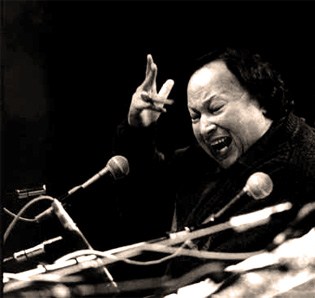
Ustad Nusrat Fateh Ali Khan was a Pakistani singer, songwriter, and music director. He was primarily a singer of qawwali — a form of Sufi devotional music. Often called the "Shahenshah-e-Qawwali", he is considered by The New York Times to be the greatest qawwali singer of his generation. He was described as the fourth greatest singer of all time by LA Weekly in 2016. He was known for his vocal abilities and could perform at a high level of intensity for several hours. Khan is widely credited with introducing qawwali music to international audiences. He was also a master in Hindustani classical music.

Raj Kapoor, also known as Ranbir Raj Kapoor, was an Indian actor, film director and producer, who worked in Hindi cinema. He is considered one of the greatest and most influential actors and filmmakers in the history of Indian cinema, and has been referred to as The Greatest Showman of Indian Cinema and as the Charlie Chaplin of Indian Cinema.

Udit Narayan Jha is an Indian playback singer whose songs have been featured mainly in Hindi films. He has also sung in various other languages including Telugu, Kannada, Tamil, Bengali, Odia, Bhojpuri, Nepali, Malayalam, Assamese, Bagheli and Maithili. He has won four National Film Awards and five Filmfare Awards with twenty nominations among many others. The Government of India honoured him with the Padma Shri in 2009 and the Padma Bhushan in 2016 for his contribution towards arts and culture. As many as 21 of his tracks feature in BBC's "Top 40 Bollywood Soundtracks of all time".

Kumaoni is an Indo-Aryan language spoken by over two million people of the Kumaon region of the state of Uttarakhand in northern India and parts of Doti region in Western Nepal. As per 1961 survey there were 1,030,254 Kumaoni speakers in India. The number of speakers increased to 2.2 million in 2011.
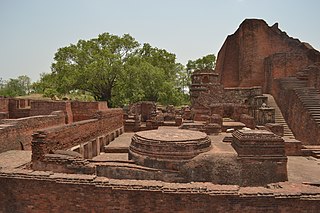
Nalanda district is one of the thirty-eight districts of the state of Bihar in India. Bihar Sharif is the administrative headquarters of this district. The districts is home to the ancient Nalanda Mahavihara a UNESCO World Heritage Site. Nalanda is located in the Magadh region of southern Bihar.

Chhau dance, also spelled Chhou dance, is a semi classical Indian dance with martial and folk traditions. It is found in three styles named after the location where they are performed, i.e. the Purulia Chhau of West Bengal, the Seraikella Chhau of Jharkhand and the Mayurbhanj Chhau of Odisha.
Jana Gana Mana is a music video produced in 2000 featuring a number of prominent Indian musicians and singers performing the Indian national anthem "Jana Gana Mana." The video was released on 26 January 2000 to mark the 50th year of the Constitution of India and the Republic Day. It has the distinction of being released by the then President of India, in the Central Hall of the Indian Parliament. It was produced by Bharat Bala and Kanika Myer and published by Ministry of Culture, Youth Affairs and Sports, Government of India.
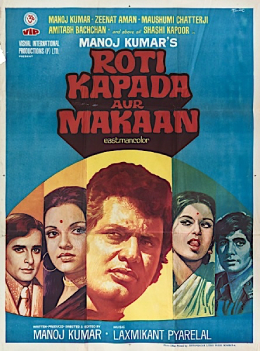
Roti Kapada Aur Makaan is a 1974 Indian Hindi-language action drama film written, directed, and produced by Manoj Kumar. The title of the movie is based on the Hindi phrase, which refers to the bare necessities of life, popularized in the late 1960s by former Prime Minister Indira Gandhi, ahead of the 1967 general elections.
Mohan Singh Mehta (1895-1986) was founder of Vidya Bhavan group of institutions and Seva Mandir in Udaipur, Rajasthan, India.
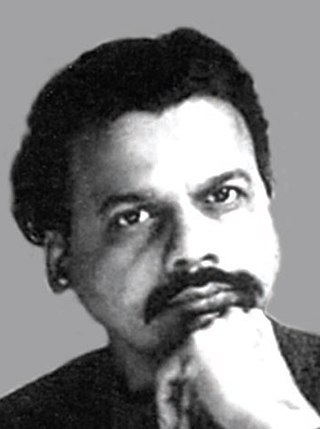
Mohan Samant was an early Indian modernist painter and member of the Progressive Artists Group. He was also a lifelong player of the sarangi, an Indian bowed string instrument.

Soup joumou is a soup native to Haitian cuisine. In 2021, soup joumou was added to the UNESCO Intangible Cultural Heritage List.

Mohan Singh (1905–1978) was a noted Indian poet in the Punjabi language and an academic, and one of the early pioneers of modern Punjabi poetry.
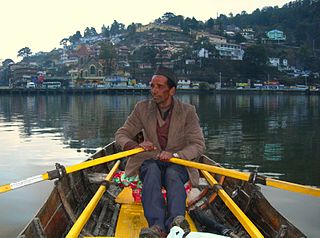
Kumaonis, also known as Kumaiye and Kumain, are an Indo-Aryan ethno-linguistic group who speak Kumaoni as their first-language and live mostly in Kumaon division in the state of Uttarakhand in India and parts of the Sudurpashchim Province in far western Nepal.

The International Film Festival of India (IFFI), founded in 1952, is one of the film festivals in Asia. Held annually, currently in the state of Goa, on the western coast of the country, the festival aims at providing a common platform for the cinemas of the world to project the excellence of the film art; contributing to the understanding and appreciation of film cultures of different nations in the context of their social and cultural ethos, and promoting friendship and cooperation among people of the world. The festival is conducted jointly by the National Film Development Corporation of India and the state Government of Goa.
Mohan Mishra was an Indian physician, known for his studies on Visceral leishmaniasis, and its treatment using Amphotericin B, regarded by many as a pioneering attempt. The Government of India honoured him, in 2014, with the award of Padma Shri, the fourth highest civilian award, for his contributions to the fields of medicine.
Bal Krishen Thapar was an Indian archaeologist who served as the Director-general of the Archaeological Survey of India from 1978 to 1981. He was the founder of INTACH.
Kedar Nath Sahoo was an Indian classical dancer, known as one of the leading exponents of the Seraikella tradition of Chhau dance. He served as the founder director of the Government Chhau Dance Centre of the Government of Jharkhand where he served from 1974 to 1988. During the early stages of his career, he performed with the troupe led by Kumar Bijay Pratap Singh Deo, but later led his own group of dancers for performance in many places in India and abroad including Eastern Europe, South America and Southeast Asia. His students included many notable dancers like Sharon Lowen, Gopal Prasad Dubey and Shashadhar Acharya. He was a recipient of the 1981 Sangeet Natak Akademi Award and the Government of India awarded him the fourth highest civilian honour of the Padma Shri, in 2005, for his contributions to arts. Towards the latter part of his life, his health failed and he died on 8 October 2008 at his home in Kansari tola, aged 88. He was married, and had five sons and four daughters.

The 1965 Indian Everest Expedition reached the summit of Mount Everest on 20 May 1965. It was the first successful scaling of the mountain by an Indian climbing expedition.
Nidumolu Sumathi, also known as Dandamudi Sumathi is an Indian percussionist, primarily playing the mridangam. She is married to "Mridangam Maestro" Sri Dandamudi Ram Mohan Rao. She is one of the first female mridangam players in India, and the first female Laya Vinyasam artist. Sumathi received India's fourth-highest civilian award, Padma Shri, in 2021.
In 1988, Mohan Kumar was listed by UNESCO as one of the 40 greatest artists in the world.